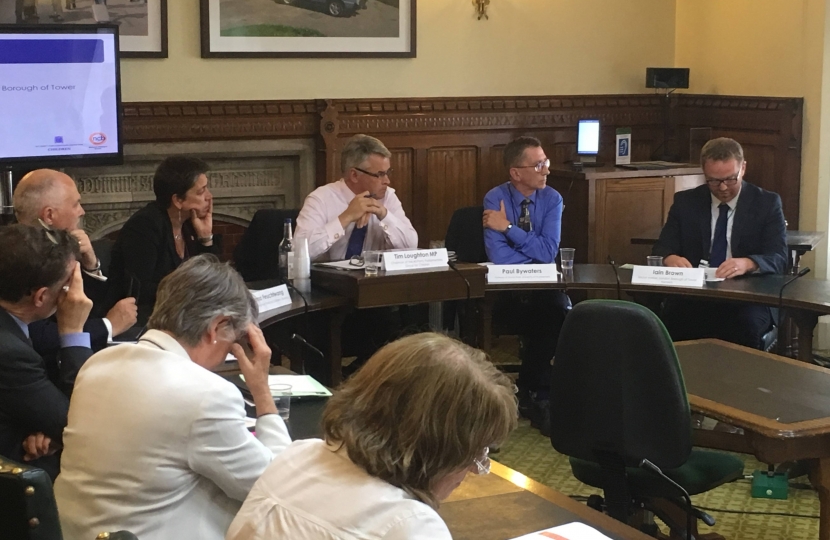
An inquiry by the All-Party Parliamentary Group for Children, suggests children’s safety is being put at risk by a system of social care that varies wildly from place to place, and where children must often reach grave danger before getting any help at all.
More than 4 in 5 Directors of Children’s Services surveyed by the inquiry described a postcode lottery of support, where children facing similar problems get different levels of help early on depending on where they live, with almost two thirds saying this even applied to cases where the child was at significant risk.
Concerns about variations between services were supported by the inquiry’s analysis of ‘threshold documents’, which set out how local areas must respond to children’s needs. Some of these documents differed notably from each other in the response they prescribed, including help for children who self-harm, those in families suffering domestic violence, and those who need support with housing problems.
Social workers highlighted that when services did step in, it was increasingly only when children and families had reached crisis point. Of the 1,700 social workers surveyed[1], 70 per cent said the threshold for helping ‘children in need’ – a legal term applied to children who require extra support but are not at risk of serious harm – had risen in the last three years, with half saying the point at which a child protection plan was triggered had gone up.
Evidence given to the inquiry suggested that funding constraints are affecting day-to-day decisions about whether to intervene to support a child. Budget pressures particularly undermined decisions about how to help a child early on, through, for example, family support, teenage pregnancy interventions, respite breaks for the families of disabled children, youth clubs and children’s centres. But there were also first-hand accounts that pressures on resources are influencing decisions about whether to take action to safeguard children at risk of harm.
Professionals described a system where decisions do not seem transparent and are hard to understand. The inquiry heard of incidences where children and families already receiving support were deemed to no longer reach the threshold for help because their local authority was shifting its priorities to more acute cases, or they had moved to an area which didn’t help families at their level of need. Teachers told the inquiry criteria for accessing services changed year-on-year and did not reflect local guidance on who should qualify.
This feeling of bewilderment is also experienced by children and young people who have grown up in care. Evidence from care leavers highlighted the difficulty they faced gaining insight into their personal histories. They called for better support in accessing and understanding information contained in official files.
Tim Loughton MP, chair of the All-Party Parliamentary Group for Children and former Children’s Minister, said:
“Children and families around the country with the same urgent needs are getting significantly different levels of help, and in some case, no support at all.
“This is true for families who struggle to cope on low income, living in poor housing which puts their children’s health in jeopardy. It’s true for children who are harming themselves yet are kept waiting for treatment because they aren’t at immediate risk of suicide. These people need help now, regardless of where they live.
“In some places, the pressure on children’s services is so acute it is leaving social workers feeling that the only tool available to them to keep a child safe is to remove them from their family. As a result, families may look at these skilled and caring professionals with mistrust. But this is wrong. It is the woeful underfunding by Government of a proper breadth of social care interventions that is to blame.”
Anna Feuchtwang, director of the National Children’s Bureau, said:
“It makes no moral sense that families are left to face crisis and children are put at risk of serious harm because services are chronically underfunded.
“What’s more, it makes no financial sense. The evidence from social workers, academics and service leaders is overwhelming: early help services reduce the need for crisis support later on. It is a farce that social workers and service leaders have to put cases to one side because they haven’t got the resources to intervene – knowing full well that many of those same cases will be back with a vengeance later, at much greater personal cost to our children and families and at much greater expense to our services. This is storing up trouble and it cannot go on.”
The All-Party Parliamentary Group for Children recommends that:
- The Government address the gap in funding for children’s social care services and put in place a sustainable long-term funding settlement for early help and preventative services
- The Government consult on how to introduce a legal duty on local authorities to provide early help to children, young people and their families, providing a statutory ‘safety net’ for these services
- The Government expand its review of children in need to gather evidence on thresholds for accessing ‘children in need’ support under s.17 and what underlies variation in the proportion of children designated ‘in need’ across the country.
